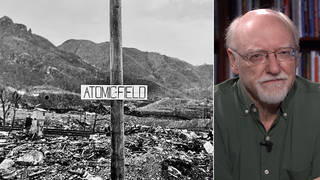
Topics
Guests
- Bruce Cumingsprofessor of history at the University of Chicago. He is the author of several books on Korea, including Korea’s Place in the Sun: A Modern History and North Korea: Another Country.
North Korea tested a ballistic missile last month, sparking widespread international condemnation. The test was a violation of a United Nations Security Council resolution. North Korea claimed the test was a successful launch of an intermediate-range missile. The test came while Trump hosted Japanese Prime Minister Shinzo Abe over the weekend at the Trump-owned Mar-a-Lago resort in Palm Beach, Florida. We speak to professor Bruce Cumings about the significance of the timing of North Korea’s action.
Transcript
AMY GOODMAN: And then talk about what this means for what has taken place over the weekend, in the last weeks, with North Korea, the launch of the missiles, and then the U.S.-South Korea military exercises.
BRUCE CUMINGS: Well, of course, the U.S. holds these exercises every year, because South Korea, under Park’s leadership, is a welcoming country for these war games involving, as you said, hundreds of thousands of troops. There aren’t many other countries in the world who are willing to do that. And the North, predictably, responds every time with missile tests or bomb, atomic bomb, blasts.
In this case—and I want to emphasize that the North Koreans pay acute attention to what’s going on in Washington, and they try to do something that symbolizes what they want from the U.S. or to try and get attention. They did that when Prime Minister Abe was having dinner with President Trump at Mar-a-Lago a few weeks ago. And they basically presented a missile right in the middle of the dinner. They tested a missile. Trump pulled out his 1990s flip phone to discuss it.
But what wasn’t pointed out in our media is that Abe is the grandson of Kishi Nobusuke, who was a war criminal, a Class A war criminal in World War II, according to the U.S. occupation, and had been one of the people fighting against Kim Il-sung in Manchuria in the 1930s. He was responsible for munitions production. So you have Abe, who reveres his grandfather, and Kim Jong-un, who likewise reveres his grandfather, Kim Il-sung. And, basically, 70 or 80 years of history is represented by that particular missile test. But Americans think that’s a bunch of irrelevant minutiae. They don’t realize that Japan and North Korea have terrible relations, no diplomatic relations.
And basically, the North Koreans, at that dinner, wanted to present Trump with a message. The recent tests of four simultaneous missiles, of course, is a direct response to the hurried deployment of the THAAD antimissile system. They’re just rolling it out right now so they can do it before a progressive president takes over in South Korea. By doing that, the North Koreans reveal that they have capabilities that were undetected before.
AMY GOODMAN: We’re going to break and then come back to this discussion. Professor Bruce Cumings teaches history at the University of Chicago, author of several books on Korea. And we’re joined here in New York by Christine Ahn, founder and international coordinator of Women Cross the DMZ, a global movement of women mobilizing for peace in Korea. Stay with us.












Media Options